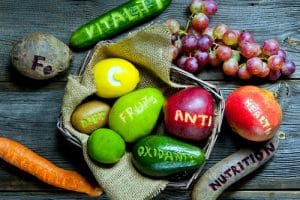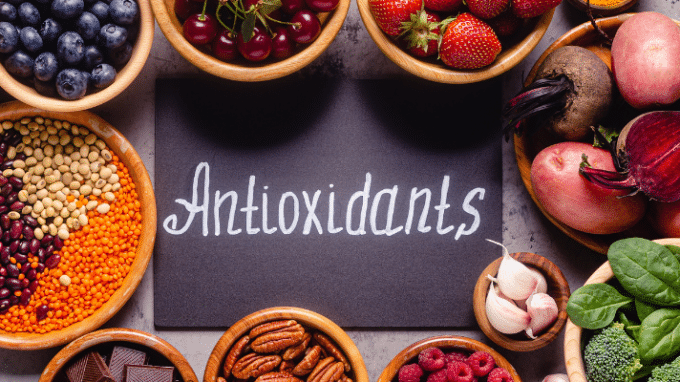Antioxidants are molecules that slow down or prevent oxidative damage to cells, either by reacting with free radicals to form less reactive metabolites or by directly fighting the reactive molecules. The importance of preventing cancer and cardiovascular disease is well-studied. The effects on female health are not studied as thoroughly. Still, recent research has shown antioxidant supplementation in women with endometriosis can improve symptoms such as chronic pelvic pain, dysmenorrhea and quality of life.
What is Endometriosis?
Endometriosis is a chronic disease defined by the disorder in the tissue that lines the uterus (endometrium) found elsewhere in the body. Common symptoms are pain during menstruation, painful intercourse and heavy or irregular bleeding. Endometriosis affects about 10% of women during their reproductive life, and it is estimated that about 50% of women with endometriosis have no symptoms.
Current Treatment
The current treatments for endometriosis are usually aimed at relieving the symptoms. Painkillers, hormonal therapies and surgery can be used depending on the stage of the disease and the specific symptoms. Surgery is one of the most efficient treatments for endometriosis, but it often does not eliminate all endometrial lesions. Since invasive surgery is complicated and sometimes risky, there is a need for other methods that can provide effective pain relief without adverse results.
Research on Women with Endometriosis
Antioxidants are beneficial for women’s health because they protect against oxidative damage. Oxidative damage is linked to many diseases, including endometriosis, cancer and cardiovascular disease. Studies suggest that oxidative damage may cause infertility or impact the quality of life (QOL) following surgery for endometriosis. In addition, an increasing number of studies have shown that antioxidants can improve the symptoms of endometriosis.
Studies have
Importance of Antioxidants for Women with Endometriosis
One study found that women who took a multivitamin, with or without vitamin E or selenium, experienced an improvement in symptoms of endometriosis. Other research has also shown that dietary supplementation with alpha-lipoic acid reduces endometriosis-related pain and aromatase suppression reduces the symptoms of endometriosis. Hence, increasing your intake of these may be just what you need to help improve your symptoms.
For some women with endometriosis, the pain and cramping associated with their periods can cause enough distress to make it hard to function. Antioxidants have been shown to improve menstrual bleeding in women with endometriosis. A new study found that adding N-acetyl cysteine (NAC) to a birth control pill helped relieve symptoms of endometriosis in women with heavy bleeding from their periods.
It’s been found that women with endometriosis have low levels of antioxidants, particularly vitamin E. Therefore, increasing your intake of certain supplements does help give your immune system a boost and improve your symptoms.
It’s been shown that women who take antioxidant supplements have a lower risk of dying from ovarian cancer. The reduction in oxidative stress caused by this supplementation is likely responsible for this effect. And since research shows that endometriosis is associated with an increased rate of ovarian cancer, antioxidants not only protect you from the effects of oxidative stress, but they also prevent cancer.
In a recent study, a high risk of oxidative stress was observed in women with endometriosis, which negatively affected the oocyte quality and embryonal development, including DNA damage, chromosomal abnormalities and immunological factors. The antioxidant supplementation reduced oxidative stress and improved the fertilization success rate.
What Are Some Excellent Sources?
Several antioxidants have been investigated concerning endometriosis. They include vitamins A, C and E, carotenoids, flavonoids, selenium and polyphenols such as resveratrol and epigallocatechin gallate (EGCG).
These nutrients can be found in various foods, such as fruits and vegetables, whole grains, nuts, seeds and fish. In addition to eating a healthy diet, you can also take supplements to ensure that you are getting enough of these nutrients.
Vitamin C is
Vitamin E is also critical for women with endometriosis. This vitamin has been shown to reduce inflammation, pain and scarring associated with the condition. Vitamin E is also an essential nutrient for reproductive health, as it helps to improve egg quality and protect the eggs from damage.
Selenium is a trace mineral that is essential for good health. Selenium has powerful antioxidant properties and can help to reduce inflammation. This mineral is also necessary for the production of glutathione, which is a potent antioxidant that helps to protect cells from damage.
EGCG is a type of polyphenol known as catechin. It is found in green tea and has powerful antioxidant and anti-inflammatory properties. EGCG is an effective treatment for endometriosis, pain, inflammation and scarring associated with the condition.
Conclusion
Getting enough antioxidants is essential for all women, but it is crucial for those with endometriosis. If you are looking to improve your symptoms of endometriosis, be sure to include plenty of antioxidants in your diet or take supplements to ensure that you are getting enough of these critical nutrients.




